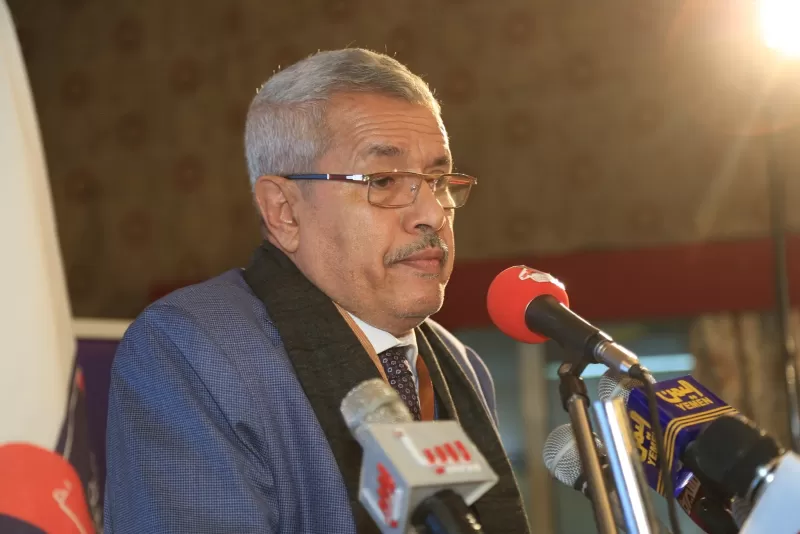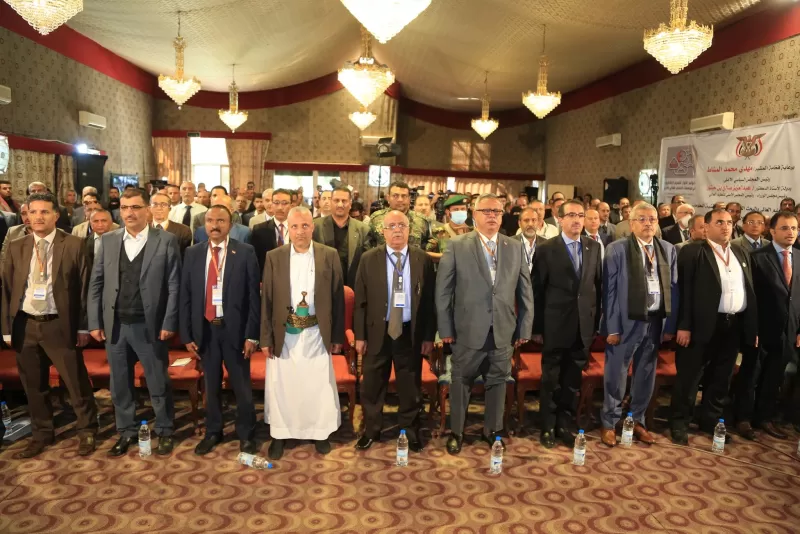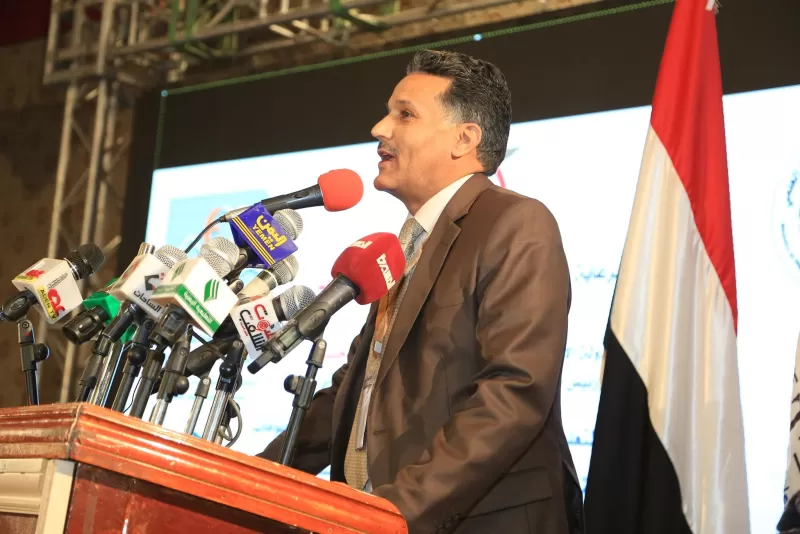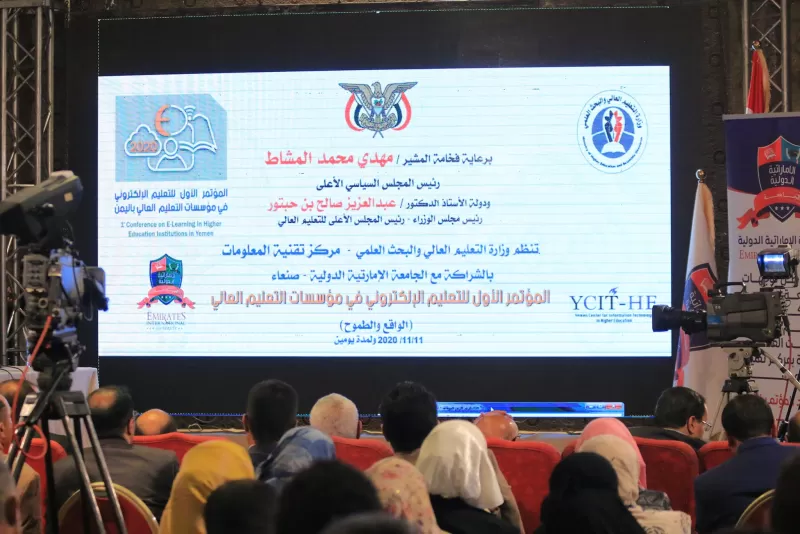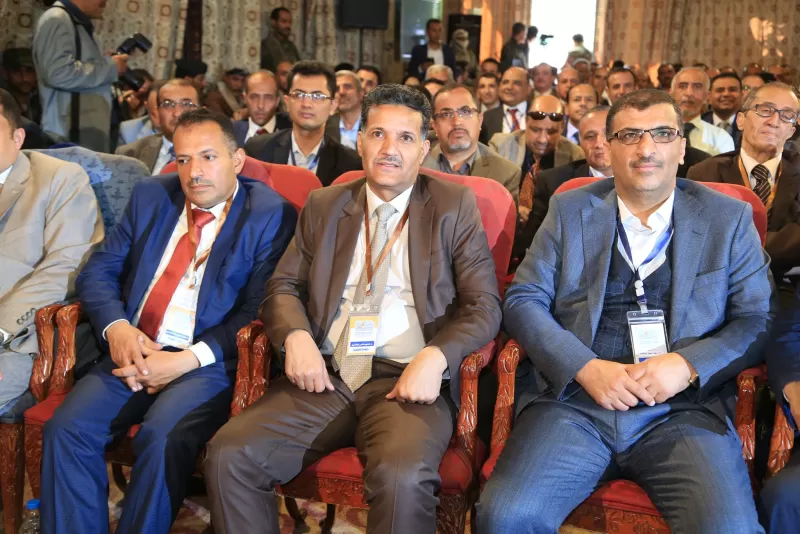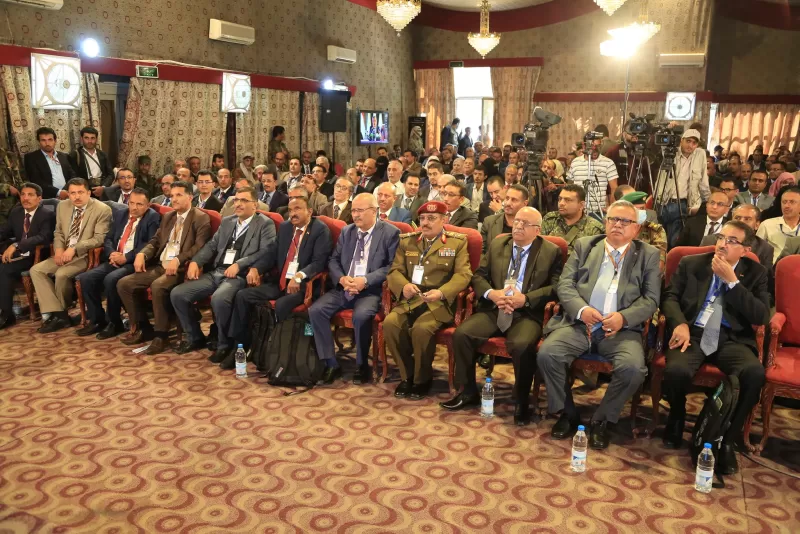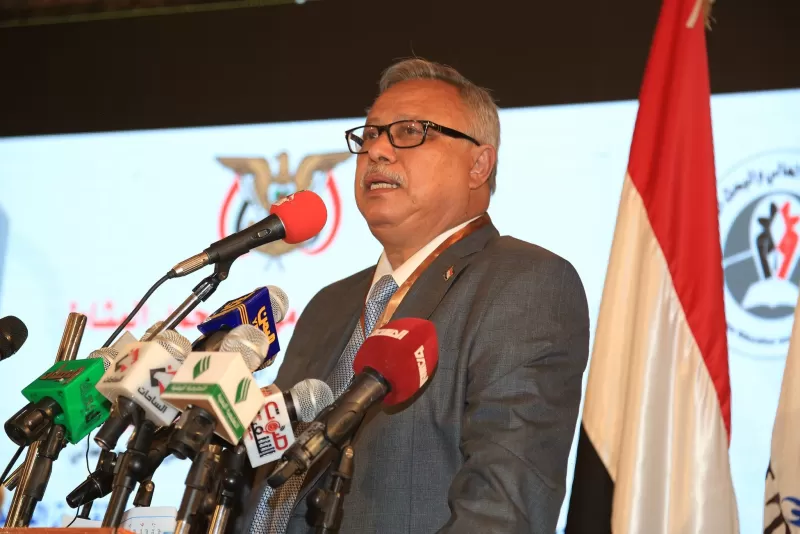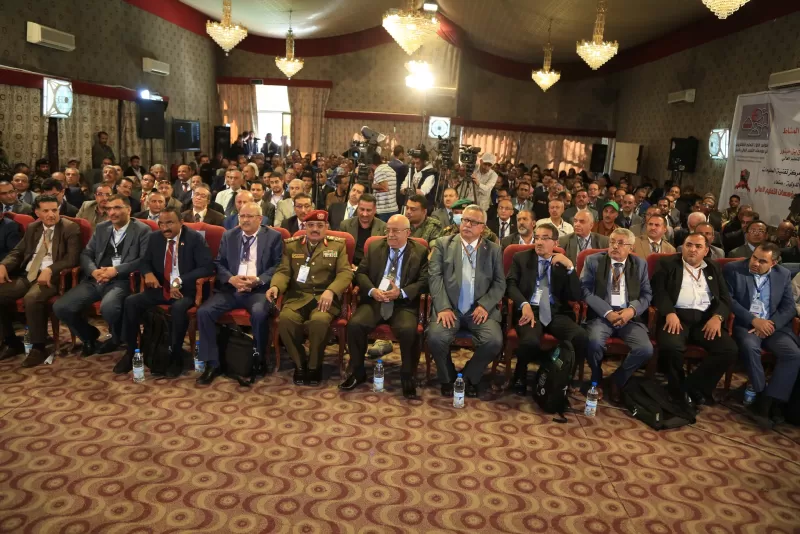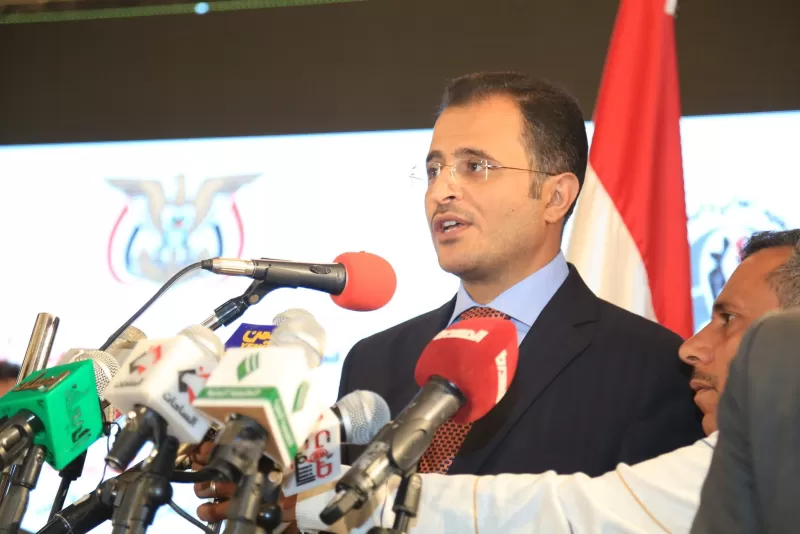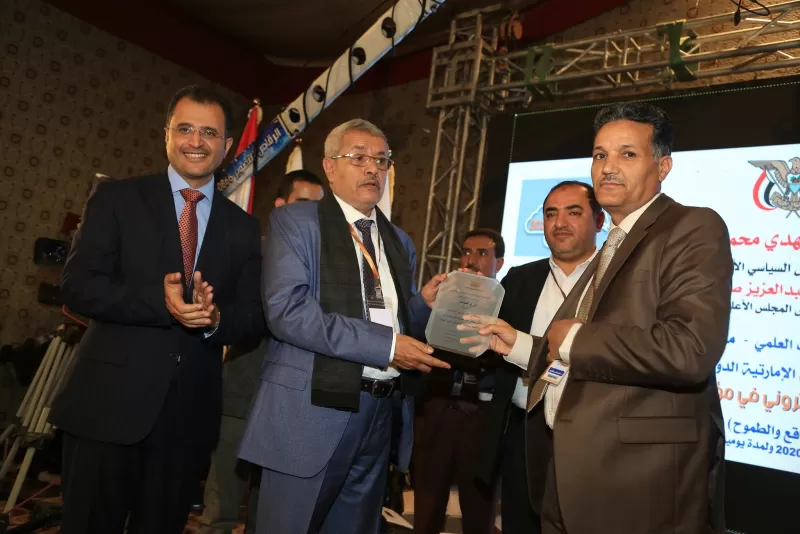Emirates International University
Modernity
Distinguish
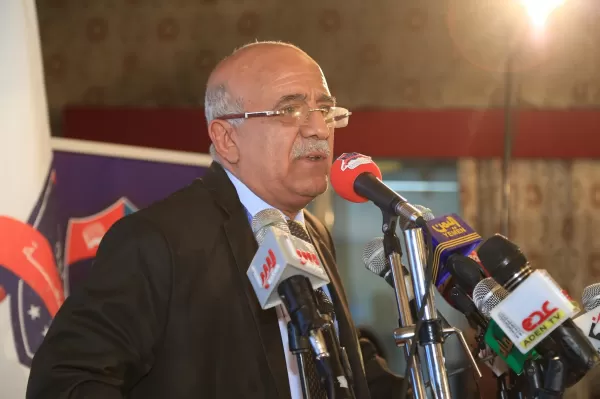
In partnership with Emirates International University The launch of the first scientific conference for e-learning in Yemen
University media
The work of the first scientific conference for e-learning in higher education institutions in Yemen, "Reality and Aspirations", was launched today in the capital, Sana'a, which is joined by the Ministry of Higher Education and Scientific Research represented by the Information Technology Center, in partnership with the Emirates International University. In which a group of academics and researchers from various Yemeni universities and decision-makers participate, as well as the participation of international experiences from "Yemen, Egypt, Sultanate of Oman, Palestine and Malaysia". In the opening session of the conference, in the presence of members of the Supreme Political Council Sultan al-Sami’i and Muhammad al-Nuaimi, a member of the Supreme Political Council, Ahmed Ghaleb al-Rahwi, considered the convening of the conference under the current circumstances a message to the world to continue the steadfastness of the Yemeni people, their movement and their ability to influence, make transformations and break down the barriers that were imposed on them. He pointed out that the conference is part of the projects and activities of the National Vision, which are centered on encouraging creativity, innovation and scientific research, especially as the conference coincides with the 50th anniversary of the founding of the universities of Sana'a and Aden. Al-Rahwi stressed that digital and electronic education has become today one of the most important means that support the educational process and transform it from the stage of indoctrination to creativity, interaction, and skills development through electronic multimedia using the latest methods to spread science and knowledge. The Supreme Political Member of Al-Rahwi noted the role of the Ministry of Higher Education, the Information Technology Center and the UAE University in organizing the first e-learning scientific conference to highlight how to benefit from e-learning and employ its outputs in the development process. Al-Rahwi called on the participants in the conference, who represent a group of Yemeni university presidents, researchers and specialists in this field, to come up with recommendations that contribute to raising the level of higher education in Yemen. Meanwhile, Prime Minister Dr. Abdulaziz Saleh bin Habtoor stressed that the conference is one of the exceptional and important scientific conferences that will provide a scientific model that contributes to solving the problem of distance education and the complexity faced by everyone. He pointed to the importance of information technology, which has become a part of the researcher, student, professor, and community life in general, stressing that everyone in higher education and its institutions, in partnership with the Ministry of Communications and Information Technology, are concerned with overcoming the complications related to technology and dealing with it as an important means that can be communicated directly to the student and to modern references. and old. The conference considered a kind of actual partnership between the Ministry of Higher Education and Scientific Research and public, private and private universities and an interesting experience that encourages joint work in this field. The Prime Minister referred to the great challenge imposed by Covid 19 on all sectors, including the education sector, and the important practical means that e-learning represents to reduce its effects on education, noting in this regard the experience that has been adopted by a number of Yemeni universities through the distance education system and what It represented the importance of the educational process. He expressed the thanks and appreciation of the Supreme Political Council and the Council of Ministers to the Ministry of Higher Education and its leadership, which was able to gather this qualitative number of professors, scholars and thinkers who are Yemen's real wealth that has not been squandered despite the aggression and siege of five years and seven months. Dr. Bin Habtoor directed the Ministry of Communications and Information Technology to work on everything that would develop the Internet service and increase its speed in order to achieve positive benefit from it in various fields, at the forefront of higher education and scientific research, and to contribute to transforming the outcomes of this conference into a tangible and easy reality. At the conclusion of his speech, he expressed his thanks to the Supreme Political Council and its remarkable presence in supporting the conference, the role of the Minister of Higher Education, his deputy, and agents, and all the efforts made to produce the conference materials. At the conference, which was attended by Deputy Prime Ministers for Security and Defense Affairs, Lieutenant-General Jalal Al-Ruwaishan and the National Vision, Mahmoud Al-Junaid, Minister of Higher Education and Conference President Hussein Ali Hazeb stressed that holding the first e-learning conference represents one of the most important scientific conferences at the level of Yemen to discuss and enrich the reality of e-learning, reality and aspirations. He explained that e-learning has become today one of the important and essential topics of the era necessitated by the inevitability of developing the educational process within the framework of the national vision for building the modern Yemeni state. Minister Hazeb referred to the role of the Ministry and the Information Technology Center in studying the issue in all its aspects, coordinating with the Supreme Committee to Combat Epidemics, and reaching to prepare a mechanism for resuming studies and completing exams for the academic year 2019-2020 AD, and the approval of the Council of Ministers. He pointed out that these efforts were translated into practical reality by holding the conference and allowing the largest possible number of specialists in information technology and e-learning to participate in it. He stressed that the Information Technology Center aimed through the conference to bring together academics, researchers, decision-makers and users of e-learning to discuss innovative education and ideas. And creative initiatives to contribute to opening new horizons in order to achieve a promising future for Yemen. For his part, the Executive Director of the Information Technology Center and Chairman of the Preparatory Committee, Dr. Fouad Hassan Abdul Razzaq, reviewed the conference’s axes to improve the e-learning environment and enable its employees to integrate into the digital knowledge age to overcome the challenges faced by educational technology and technologies in Yemen. Dr. Abdul Razzaq indicated that holding the conference comes as a culmination of measures adopted by the Ministry of Higher Education and the Information Technology Center to set controls to complete the educational process for the second semester of the academic year 2019-2020, which was halted due to the Corona pandemic. He stressed that the experience of Yemen in light of the Corona pandemic opened up new horizons A new one worthy of study, evaluation and development in line with the available capabilities and enhances the culture of dealing with educational technology among the parties to the educational process, to catch up with the digital knowledge development. While the President of the Emirates International University, Dr. Najeeb Al-Kumaim, stressed that holding the conference embodies the true partnership with the Ministry of Higher Education, which contributes to supporting the continuity and development of the educational process and keeping pace with developments through the use of modern technology. He explained that the conference seeks to spread the culture of e-learning and blended education in higher education institutions in Yemen, as this type of education has today become a strategic choice for various educational institutions in Yemen to translate the contents of the national vision matrix for building the Yemeni state. Dr. Al-Kumaim pointed out that Yemeni universities are one of the basic components of the development process, providing aid to the state and supporting the government by harnessing its potential in the continuity of education. He indicated that what distinguishes the conference is the local, regional and international participation in order to benefit from the technical experiences and expertise to improve the educational and electronic environment and enable the partners of the educational process to integrate into the knowledge and digital era. The conference was attended by the Ministers of Planning, Dr. Abdulaziz Al-Kumaim, Communications, Eng. Misfer Al-Numeer, the State, Hamid Al-Mazjabi, the Deputy Ministers of Higher Education, Dr. Ali Sharaf Al-Din and Education, Dr. Hamdan Al-Shami, the Presidential Adviser Dr. Abdul-Aziz Al-Turb, leaders of higher education, agents of the relevant ministries, and heads of public and private universities. After that, the conference sessions began, where the first session, chaired by the member of the Supreme Political Council, Muhammad Al-Nuaimi, and the national expert, Dr. Abdul Latif Haidar, reviewed regional and international experiences in the field of e-learning through the live broadcast technology "Zoom". The first paper dealt with hybrid education, one of the future directions for coexisting with the Corona crisis, the Egyptian experience of Dr. Jamal Ali Al-Dahshan, while the second paper presented by the Omani Dr. Ahmed bin Saeed Al-Hadrami reviewed the experience of Omani universities in e-learning. The third paper presented by Dr. Mahmoud Abdel-Majid Assaf from Palestine dealt with “the role of electronic teaching practices during the Corona pandemic in enhancing self-organized learning skills for university students”, and the fourth paper presented by Dr. Ibrahim Muhammad Al-Rajwi from Malaysia dealt with the Malaysian experience of e-learning in light of the pandemic. . While the second session, chaired by Dr. Muhammad Dhaifallah, reviewed two papers on e-learning and its tools by Dr. Ahmed Al-Haboub and the national project issued by the Ministry of Higher Education and its evaluation, which was delivered by Dr. Noaman Fayrouz and presented by a team that includes Dr. Muhammad Daifallah, Dr. Fouad Abdel Razak, Dr. Noman Fairouz, Dr. Sharaf Al-Hamdi and Dr. Moses crow. The conference, in partnership with the Emirates International University, will discuss, through six working sessions, a number of axes on the national experience of e-learning in higher education institutions, the communications and information technology system, and ways to benefit from them in the success of e-learning in Yemen. It also discusses the topics of the conference on the quality of e-learning and applied virtual education and the required standards, as well as a review of regional and international experiences on e-learning. The sessions included interventions and extensive discussion about the reality of e-learning in Yemen and the possibility of benefiting from the national experience that took place in light of the Corona pandemic and the transition to blended education to bring about a comprehensive development renaissance.

